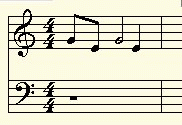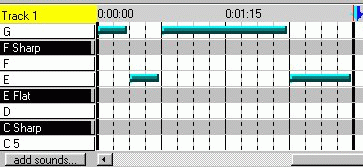
Notes and their time value

With Anvil Studio, we have the option of entering notes on a musical staff, but there is also another option called Piano Roll. Using this feature, you don't need to read music. If you can find the note on a piano keyboard, you can enter it. It is, however still necessary to understand timing. In the graphic below, we can see one measure in Piano Roll, and the exact same one on a musical staff.


In Piano Roll, the measure is divided into a grid, like graph paper. The size of the grid can be adjusted, in this case, it is in 1/16th note divisions. So we have entered an eighth note " G", eighth note "F", half note "G", and a quarter note "F".